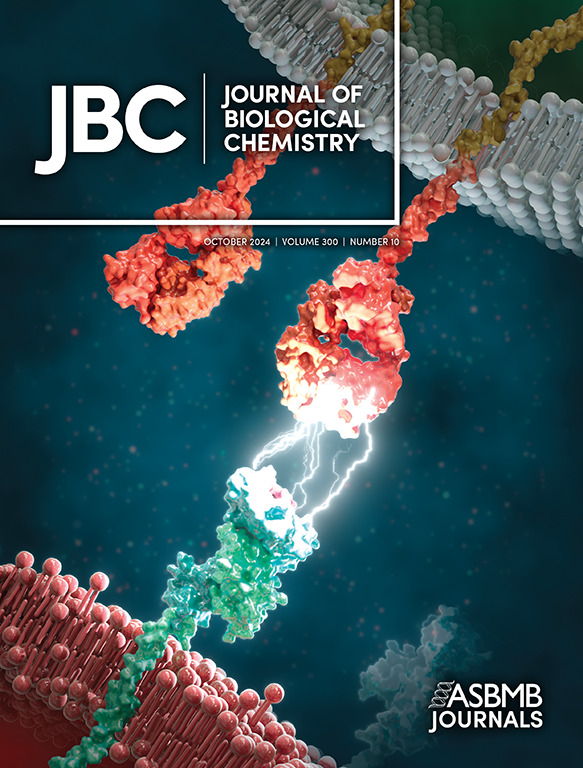The deubiquitinase OTUD4 suppresses TAK1 kinase-dependent NF-κB signaling and inflammation.
IF 4
2区 生物学
Q2 BIOCHEMISTRY & MOLECULAR BIOLOGY
引用次数: 0
Abstract
Chronic inflammation contributes to the development of many cancers, including non-small cell lung cancer (NSCLC), and is characterized by persistent activation of pro-inflammatory NF-κB signaling. The mechanisms that restrain NF-κB signaling remain incompletely defined. Here, we identify the deubiquitinase OTUD4 as a suppressor of tumor necrosis factor (TNF)-induced NF-κB activation and chronic inflammation. OTUD4 interacts with core components of the TAK1 signalosome, including TAK1, TAB1, and TAB3, and removes K63-linked polyubiquitin chains from substrates within this complex, such as TAK1 and TAB3, thereby reducing TNF-induced NF-κB signaling. A histidine-centered loop (His loop) in the catalytic domain is required for this K63 linkage specificity. The tumor-associated OTUD4 H148Y missense variant (c.442C>T, p.H148Y), located within this loop, retains TAK1 binding but abolishes intrinsic deubiquitinase activity toward both K63- and K48-linked chains and is associated with sustained NF-κB activation and increased pro-inflammatory cytokine expression. Collectively, these results reveal a mechanism that suppresses TNF-induced NF-κB signaling and links OTUD4 dysfunction to inflammation-driven oncogenesis, including NSCLC.去泛素酶OTUD4抑制TAK1激酶依赖的NF-κB信号传导和炎症。
慢性炎症有助于包括非小细胞肺癌(NSCLC)在内的许多癌症的发展,其特征是促炎NF-κB信号的持续激活。抑制NF-κB信号传导的机制尚未完全确定。在这里,我们发现去泛素酶OTUD4是肿瘤坏死因子(TNF)诱导的NF-κB激活和慢性炎症的抑制因子。OTUD4与TAK1信号体的核心组分(包括TAK1、TAB1和TAB3)相互作用,并从该复合物的底物(如TAK1和TAB3)中去除k63连接的多泛素链,从而减少tnf诱导的NF-κB信号传导。催化结构域的组氨酸中心环(His环)是K63连锁特异性所必需的。肿瘤相关的OTUD4 H148Y错义变体(c.442C>T, p.H148Y)位于该环内,保留TAK1结合,但消除K63-和k48链的内在去泛素酶活性,并与持续的NF-κ b激活和促炎细胞因子表达增加有关。总的来说,这些结果揭示了抑制tnf诱导的NF-κB信号传导的机制,并将OTUD4功能障碍与炎症驱动的肿瘤发生联系起来,包括NSCLC。
本文章由计算机程序翻译,如有差异,请以英文原文为准。
求助全文
约1分钟内获得全文
求助全文
来源期刊

Journal of Biological Chemistry
Biochemistry, Genetics and Molecular Biology-Biochemistry
自引率
4.20%
发文量
1233
期刊介绍:
The Journal of Biological Chemistry welcomes high-quality science that seeks to elucidate the molecular and cellular basis of biological processes. Papers published in JBC can therefore fall under the umbrellas of not only biological chemistry, chemical biology, or biochemistry, but also allied disciplines such as biophysics, systems biology, RNA biology, immunology, microbiology, neurobiology, epigenetics, computational biology, ’omics, and many more. The outcome of our focus on papers that contribute novel and important mechanistic insights, rather than on a particular topic area, is that JBC is truly a melting pot for scientists across disciplines. In addition, JBC welcomes papers that describe methods that will help scientists push their biochemical inquiries forward and resources that will be of use to the research community.
 求助内容:
求助内容: 应助结果提醒方式:
应助结果提醒方式:


